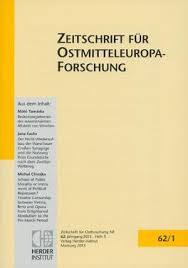Spezifika deutscher Besatzungspolitik in Warschau 1914-1916
Specific aspects of the German occupation policy in Warsaw 1914-1916
Author(s): Marta PolsakiewiczSubject(s): Military history, Political history, Pre-WW I & WW I (1900 -1919), WW II and following years (1940 - 1949), Post-War period (1950 - 1989)
Published by: Verlag Herder-Institut
Keywords: Specific aspects; German occupation policy; Warsaw; 1914-1916;
Summary/Abstract: The issue of the German occupation of Warsaw during World War I has not only been neglected by the general public, it has also been ignored by historical research. While the First World War is generally depicted as happening mostly on the Western Front, any mention of the German occupation of Warsaw, in turn, immediately brings the connotation of the Nazi reign of terror during the Second World War to mind. Memories of the first German occupation of Warsaw during the 20th century have been eclipsed by the brutal and traumatic experiences from the period between 1939 and 1945. The aim of this investigation is to capture the changes that occurred in Warsaw during the First World War, and in particular in the years of 1914-1916, and to explain how the change of regime influenced the character of the city during a phase of social revolution. To fulfil this aspiration, it is relevant to point out Warsaw’s political, cultural, ethnic as well as its economic and territorial characteristics, which had become a distinguishing feature of the metropolis since the end of the 19th century. The introductory thesis regarding Warsaw as a special case in German occupation policy during the First World War is demonstrated by emphasizing and analysing all relevant factors that the Germans had to face in this city. Considering the differences between military and strategic necessities on the one hand and calculated concessions on the other hand, it is possible to explain where the occupiers practised established policies and where they risked experimental methods. The results led to a clear change of Warsaw. Apart from the massive exploitation of Warsaw and the Generalgouvernement, it should be noted that many decisions of the occupying forces initiated positive structures and sustainable development for post-war Poland.
Journal: Zeitschrift für Ostmitteleuropa-Forschung
- Issue Year: 58/2009
- Issue No: 4
- Page Range: 501-537
- Page Count: 37
- Language: German

